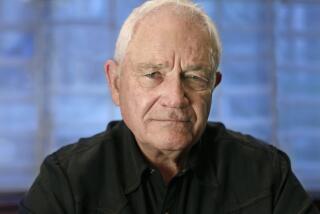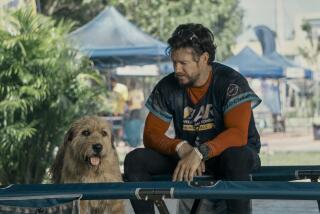Identity matters for ‘Arthur Newman’s’ Emily Blunt and Colin Firth
— When Emily Blunt was in grade school and Colin Firth was still a struggling actor, Becky Johnston was penning their characters in the first draft of a screenplay that would become “Arthur Newman.”
Twenty years later, it is finally a movie, opening Friday, a meditation on identity guised in a road trip featuring two lost souls grappling with their unenviable realities.
FOR THE RECORD:
“Arthur Newman”: An article about the film “Arthur Newman” in the April 24 Calendar section said that the movie was the first that Colin Firth signed onto after winning an Oscar for “The King’s Speech.” In fact, the first was “Gambit,” a remake of a 1966 film. —
The film marks the directorial debut of commercial director Dante Ariola, as well as the first film Firth signed onto after “The King’s Speech” turned him into an Oscar-winning actor.
PHOTOS: Hollywood Backlot moments
“Colin for so many years was trapped in doing fantastic acting in rom-coms, and all these movies that he didn’t like,” said Ariola. “I think he wanted to spend some of his capital after ‘King’s Speech’ doing films that he wanted to do.”
The script, which Johnston originally wrote for Nick Nolte after the two worked together on 1991’s “Prince of Tides,” centers on Wallace Avery (Firth), a failed pro golfer and divorced father of one, who, wishing for a different life, fakes his own death and takes on a new identity only to meet a young drifter (Blunt) also looking to escape.
Johnston first wrote the script to serve as an antidote to Nolte’s performance in “Tides” as the troubled narrator with a disturbing past, but when it didn’t get made, she forgot about it and went on to write a series of films for DreamWorks, plus the Brad Pitt-starrer “Seven Years in Tibet.”
She returned to the script five years ago.
“I wanted to do something that wasn’t a job,” Johnston said. “I had never shaken loose my original idea. I rewrote it, and then we got Dante. After 20 years, it happened so quickly it was a joke.”
Both Firth and Blunt were initially terrified of the project, which they described as “unusual” and “convention-defying.”
Chatting over salads before the film’s premiere at 2012’s Toronto International Film Festival, Firth said he was specifically drawn to the script’s informality.
“This one just didn’t lend itself to one genre,” Firth said. “It’s not the first movie to deal with someone changing their identity, but in this case they aren’t being chased by the Mafia.”
Rather, it’s internal demons caused by a life unfulfilled that propel his character to seek out a new persona — what he thinks is a suave, sure-footed man about to embark on a new career as a golf pro at a country club.
Unfortunately, his character isn’t very good at playing someone he isn’t.
“There’s a lot more to finding a new identity than changing your car, your clothes and your driver’s license,” said Firth. “He just can’t inhabit it. It’s not in him. He’s not a good enough actor, to start.”
When Ariola first came upon the script, he knew he wanted someone to play Arthur Newman, né Wallace Avery, who was a strong enough actor to be able to play a bad one.
“The trickiest thing was watching Colin calibrate how to put on an affectation and find this guy who talks in a way that’s not very real,” Ariola said. “He was essentially layering bad acting over really subtle acting.”
Adding to the film’s complexity is the budding romance between these two lost souls — a connection the audience is intended to sympathize with yet not necessarily root for. The duo’s incompatibility is only highlighted by the stark 23-year age gap between Firth and Blunt — a factor Blunt was happy to point out during their Canadian reunion, which coincided with Firth’s 52nd birthday.
“I actually took great pleasure reminding Colin that when we first met for a movie Stanley Tucci wanted to direct us in, he was supposed to play my father,” Blunt said with a laugh.
Firth does admit to being concerned that the age gap would contribute to “this endless, strange, age-difference permissiveness in cinema where guys are allowed to age and the women less so. I didn’t want it to seem … “
“Pervy,” Blunt interjected.
“The casting is a bit pervy,” Firth conceded. “But I didn’t want the whole theme of the film to disappear into some notion of it being predatory in that way. It’s not a sexual midlife crisis. I think he just wants to cuddle.”
MORE
INTERACTIVE: Christopher Hawthorne’s On the Boulevards
CHEAT SHEET: Spring Arts Preview
PHOTOS: Arts and culture in pictures
More to Read
Only good movies
Get the Indie Focus newsletter, Mark Olsen's weekly guide to the world of cinema.
You may occasionally receive promotional content from the Los Angeles Times.






